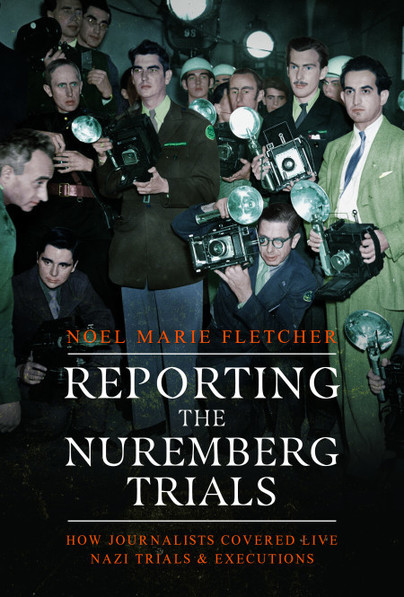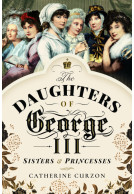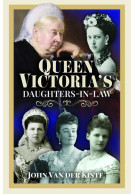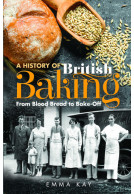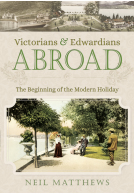Reporting the Nuremberg Trials (ePub)
How Journalists Covered Live Nazi Trials and Executions
Imprint: Pen & Sword History
File Size: 3.5 MB (.epub)
Pages: 224
ISBN: 9781399045841
Published: 7th June 2024
| Other formats available - Buy the Hardback and get the eBook for £1.99! | Price |
|---|---|
| Reporting the Nuremberg Trials Hardback Add to Basket | £25.00 |
For the first time, journalists who shared details about Nazi crimes from the International Military Tribunal, better known as the Nuremberg Trial, have their own story told.
As World War II in Europe drew to a close in 1945, the Allies prepared to hold Nazi leaders accountable for crimes against humanity and selected Nuremberg as the site for the trial. The U.S. military took the lead in refurbishing a courtroom and making accommodations for 325 journalists and 23 defendants plus Allied judges, prosecutors, translators and administrative staff. Because publicity was a main consideration, the latest innovations and technology were incorporated into the courtroom to enhance news coverage of the trial. Press passes were in demand worldwide for courtroom seats. A press pool was selected to witness the executions in which 10 criminals were hung on Oct. 16, 1946.
Famous war correspondents and young journalists who later became household names were headquartered in a castle, explored bombed ruins and faced dangers as a lingering spirit of Nazism seethed within the city. The lengthy trial became an excruciating endurance test for journalists by the time it ended (far longer than expected) on Oct. 1, 1946, setting a precedent for coverage of subsequent justice at Nuremberg.
The author, a long-time journalist and former foreign correspondent, provides an insider’s look at how the news was gathered and conveyed. The book is based on extensive research and insights gathered from Nuremberg, including at the location where the journalists were housed and at the courtroom itself.
“While the writing is lively, this is a carefully reported story. The primary sources are newspaper articles buttressed by memoirs and trial transcripts. Author Fletcher, who is herself a seasoned journalist, spent time in spent time in Nuremberg itself to make sure she absorbed the feel of the place.”
The Journal of America’s Military Past
There is a lot to like here, from the you-are-there courtroom coverage, to the descriptions of Germany in the immediate postwar period, to reflections on recording and disseminating history, and finally to lessons that are relevant to journalists — and their readers or listeners today.
Dr. Nicholas E. Reynolds, bestselling author, Col. USMCR (ret.) & editor of 'The Journal of America’s Military Past'
The author’s focus is on the first trial of major Nazi war criminals, the International Military Tribunal, in 1945 and 1946…There are many books about the trials themselves but up until now not much coverage of the many journalists who reported on the trials. This matters — because the point of the trials was not just to punish the criminals, but to get the word out about their unprecedented crimes. The world needed to know what they had done, and to see that they had been judged.
The military historian will be interested not just in reading about the leaders of the German Army and Navy (who don’t seem to have even the faintest grasp that they had just committed monumental war crimes) but also about life in post-war Germany, especially Nuremberg, very soon after the fighting ended. The author does an excellent job of showing the reader what the city, once styled the capital of the Nazi Party, was like in 1945 — the wholesale destruction, the terrible smell of the dead lying under the rubble, the destitute population, the orphaned children who turned to prostitution to survive, even occasional gunfire. We are reminded that wars don’t simply end when the shooting officially stops; the phase that comes next must not be forgotten.
We come to appreciate these journalists as they go about their work. While the writing is lively, this is a carefully reported story. … this is a book that historians, journalists, and citizens alike can enjoy and learn from. The author’s conclusion is “had it not been for these correspondents, the Nuremberg trials likely would continue to sit on law library bookshelves filling twenty-two volumes with pages yellowing in time.”
As featured.
Quill Magazine
Read the interview here.
“Author Noel Marie Fletcher’s skillfully organized narrative is enlivened and ennobled by her admirable balancing of the varied personal accounts…”
ARGunners.com
Read the full review here.
Reporting is often the first step in defining history. The Nuremberg trials have been seen and experienced through media and are part of how we saw the aftermath of WW2. Through this book, we can also see the making of this important story, and knowing what was done in preparation and behind the scenes gives depth and meaning to the important journalistic work.
Lars Boering, director of the European Journalism Centre foundation
“Full of relevance for the present, this book not only places the journalists who reported from the Nuremberg trials centre stage but, with them, the very idea of vocation central to any meaningful definition of journalism in a democracy. More complex than a potentially dry report, we have instead a cross-fertilisation of serious political commentary with accounts of the human interest latent in the foibles and fanaticism of the Nazis brought into the public gaze. Despite the wealth of underpinning archival material, the pace never flags and the style remains engaging throughout.”
Martin D. Conboy, Emeritus Professor of Journalism History, University of Sheffield
The unhurried, ruthless meting of international justice at end of World War II in dismal, post-war Germany plays out through the words and recollections of a battalion of journalists who covered the Nuremberg Trials for 11 months in Noël Marie Fletcher's meticulous, richly-detailed, era-capturing 'Reporting the Nuremberg Trials.'
Jesse Garnier, Journalism Chair and Associate Professor, San Francisco State University
Over its 203 pages, Fletcher transports us to a defeated Nuremberg reeking of war and death, then into the courtroom and private spaces of reporters determined to cover the nascent spectacle of international justice. Fletcher colorfully carries readers through a rotating cast of hundreds of correspondents, from household names like Walter Cronkite, to pioneering woman journalists like Ann Stringer who persisted despite outward abuse and unfit conditions.
'Reporting the Nuremburg Trials' is steeped in reverence for an era in journalism faintly lit by modern history despite its many parallels to today. Fletcher again and again reveals lessons for today's real-time news cycles, including the perils of misinformation, professional subterfuge and abbreviated ethics.
Fletcher's poring over thousands of pages of court documents, notes and reporting paints a vivid picture of a legal process slowly marching toward the inevitable, while deftly weaving the grindingly slow and gruesome minutia with the challenges, culture, and conflicts inside a competitive and determined international press corps.
Against today's strictly digital media spaces, the grainy, black-and-white lessons of tyranny, suffering and loss after World War II seem buried so coldly within history's vault as to be broadly forgotten and easily repeated.
'Reporting the Nuremberg Trials' artfully captures some of the world's darkest days of reckoning with heinous acts of violence. Fletcher conveys a media culture driven by leaks, fueled by unofficial sources documenting a ward of international villains parading toward their deaths.
Noël Marie Fletcher has done us a great service in writing this lucid and highly readable account of the pivotal role played by the international press at the Nuremberg Trials in the months following Germany's defeat in the Second World War. Reporting the Nuremberg Trials brings to life in vivid detail the evidence, the atmosphere of tension, and the personalities assigned to inform the world about the 20th century's most consequential tribunal that brought the most notorious war criminals of the Nazi regime to justice. A must-read for scholars and students of history, human rights, and the role of media in the modern world.
Scott Wallace, bestselling author of The Unconquered: In Search of the Amazon's Last Uncontacted Tribes and Central America in the Crosshairs of War.
About Noel Marie Fletcher
NOËL MARIE FLETCHER is a career journalist and award-winning author living in Washington, D.C. She earned her B.A. in journalism from San Francisco State University and completed all Master’s coursework at the Missouri School of Journalism in Columbia, one of the oldest formal journalism schools in the world. She started her journalism career in California and moved to Hong Kong where she covered the High Court for the HongKong Standard newspaper. She became a foreign correspondent for The Journal of Commerce, America’s oldest daily business paper, and travelled throughout Asia before being posted to Beijing as China Correspondent. She is a founding member of the Foreign Correspondents’ Club of China and has written extensively for newspapers, magazines and wire services. In 2017, she wrote briefly in Berlin for The Times (London) before returning to the U.S. to cover business and government in D.C. Fletcher is the author of several books, two of which have won awards by the National Federation of Press Women. She serves on a chapter board of the Santa Fe Trail Association.







